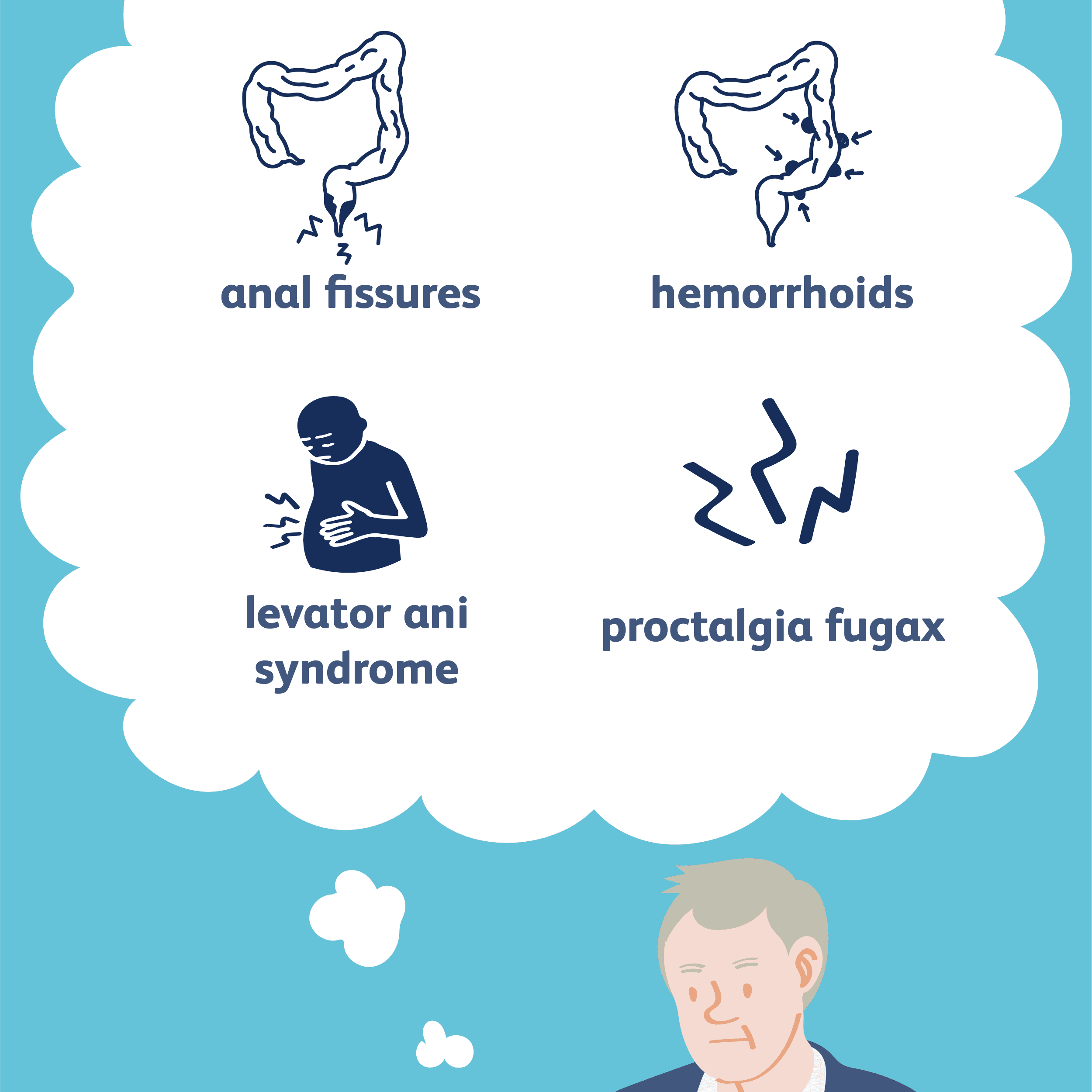Anal Pain
Overview | Possible Causes | Care and Treatment | HOME REMEDies | When to Call the Doctor | References
Overview
Anal pain — pain in and around your anus or rectum (perianal region) — is a common complaint. Although most causes of anal pain are benign, the pain itself can be severe because of the many nerve endings in the perianal region.
Many conditions that cause anal pain may also cause rectal bleeding, which is usually more frightening than serious.
The causes of anal pain usually can be easily diagnosed. Anal pain usually can be treated with over-the-counter pain relievers and hot water soaks (sitz baths).
Possible Causes
Causes of anal pain include:
- Anal cancer
- Anal fissure (a small tear in the lining of the anal canal)
- Anal itching (pruritus ani)
- Anal sex
- Anorectal fistula (an abnormal channel between the anus or rectum usually to the skin near the anus)
- Coccydynia or coccygodynia (tailbone pain)
- Constipation
- Crohn's disease (a type of inflammatory bowel disease)
- Diarrhea causing anal irritation
- Fecal impaction (a mass of hardened stool in the rectum due to chronic constipation)
- Hemorrhoids (swollen and inflamed veins in your anus or rectum)
- Levator ani syndrome (spasm in the muscles that surround the anus)
- Perianal abscess (pus in the deep tissue around the anus)
- Perianal hematoma (a collection of blood in the perianal tissue caused by a ruptured vein, sometimes called an external hemorrhoid)
- Proctalgia fugax (fleeting pain due to rectal muscle spasm)
- Proctitis (inflammation of the lining of the rectum)
- Solitary rectal ulcer syndrome (a sore on the wall of the rectum)
- Thrombosed hemorrhoid (blood clot in a hemorrhoid)
- Trauma
- Ulcerative colitis
- Ulcerative proctitis (a type of inflammatory bowel disease)
Care & Treatment
Treatment for anal pain depends on the cause, and includes:
- Medicines such as pain relievers, stool softeners and antibiotics (if there is an infection)
- A high-fiber diet to help ensure soft bowel movements
- Sitz baths with warm water to clean the anal area and relieve pain
- Surgery for muscle spasms and to repair fistulas
Other methods that may help manage the pain include the following:
- To protect the skin, avoid wiping too vigorously after a bowel movement.
- Don’t use perfumed soaps or scented detergents. These may irritate the skin.
- Don’t wear tight clothing so that the anal area can “breathe.”
- To help prevent hemorrhoids, try not to sit for too long.
Home Remedies
Depending on the cause of your anal pain, there are some measures you can try at home to get relief. They include:
- Eating more fruits, vegetables and whole grains, exercising daily, and taking stool softeners, if needed, to facilitate bowel movements, reduce straining and ease pain
- Sitting in a tub of hot water up to your hips — known as a sitz bath — several times a day to ease the pain of hemorrhoids, anal fissures or rectal muscle spasms
- Applying over-the-counter hemorrhoid cream for hemorrhoids or hydrocortisone cream for anal fissures
- Taking an over-the-counter pain reliever such as acetaminophen (Tylenol, others), aspirin or ibuprofen (Advil, Motrin IB, others)
When to Call the Doctor
Seek immediate medical attention
Have someone drive you to urgent care or the emergency room if you develop:
- A significant amount of rectal bleeding or rectal bleeding that won't stop, particularly if accompanied by lightheadedness, dizziness or feeling faint
- Anal pain that gets much worse, spreads, or is accompanied by fever, chills or anal discharge
Schedule a doctor's visit
- Make an appointment with your doctor if your pain lasts more than a few days and self-care remedies aren't helping.
- Also make an appointment with your doctor if anal pain is accompanied by a change in bowel habit or rectal bleeding.
- A hemorrhoid that develops quickly or is particularly painful may have formed a blood clot inside (thrombosed). Removing the clot within the first 48 hours often gives the most relief, so request a timely appointment with your doctor. The blood clot of a thrombosed hemorrhoid, although painful, can't break loose and travel, so it won't cause any of the complications — such as stroke — associated with blood clots that form in other parts of the body.
- See your doctor for rectal bleeding, particularly if you're older than 40, to rule out rare but serious conditions such as colon cancer.







































































































